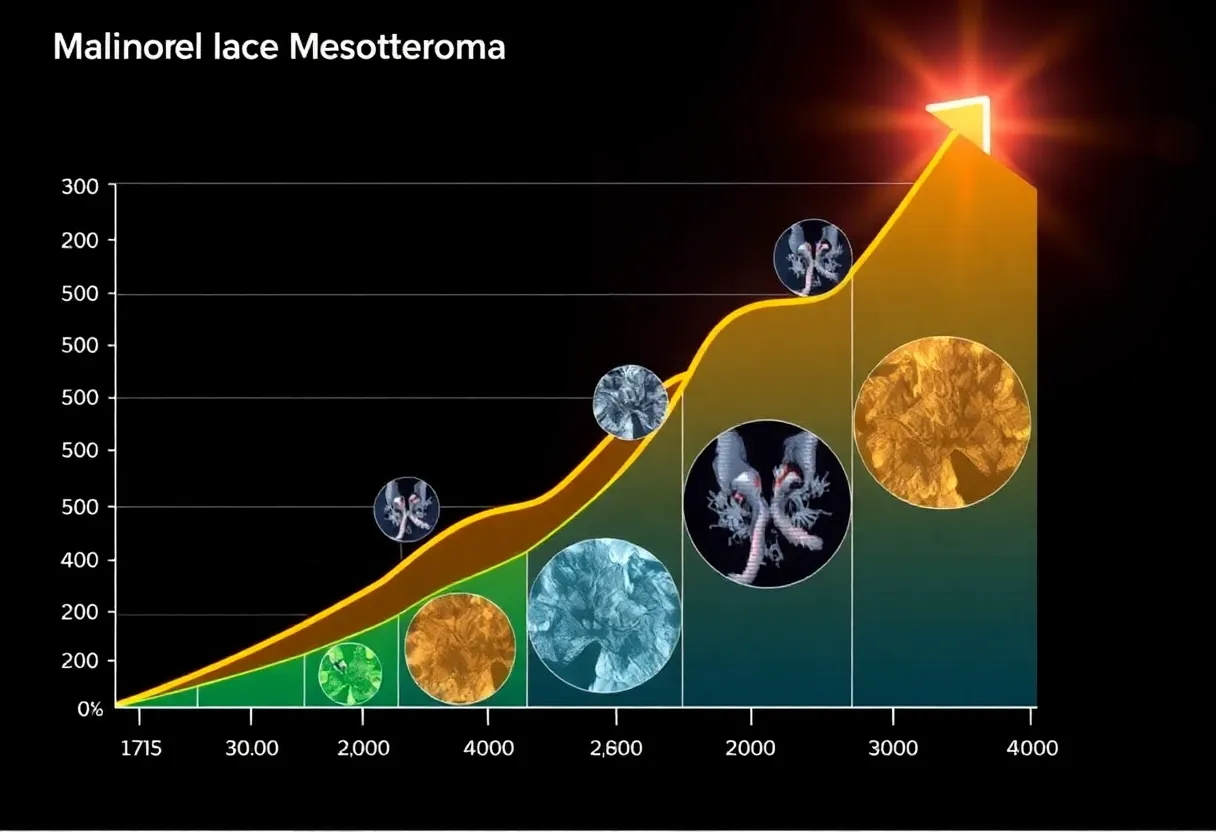News Summary
The malignant mesothelioma market is projected to grow significantly, reaching $12.2 billion by 2034 with advancements in treatment and early detection.
Malignant Mesothelioma Market on the Rise: A Promising Future for Patients
The malignant mesothelioma market is experiencing a significant transformation, with the value reaching an impressive $6.1 billion in 2023 and projecting a remarkable growth to $12.2 billion by 2034. This growth reflects a compound annual growth rate (CAGR) of 6.5% from 2024 to 2034.
Driving Forces Behind Market Growth
Key advancements in treatment options are playing a crucial role in propelling this market forward. Notably, immunotherapy drugs such as pembrolizumab and nivolumab are gaining traction, showing not only a capacity to extend survival but also significantly improve the quality of life for patients battling this fatal disease.
The emphasis on immunotherapy is changing the landscape of treatment for mesothelioma, previously dominated by traditional chemotherapy methods. Though chemotherapy remains a common treatment route, the shift towards more targeted therapies is becoming evident, with these new methods showing higher specificity to the molecular pathways linked to this aggressive cancer.
Innovations in Early Detection
Another key element transforming the narrative of malignant mesothelioma is the evolution of diagnostic technologies. Early detection remains vital since timely intervention can drastically improve patient outcomes. Recent developments in biomarkers—such as soluble mesothelin-related peptides (SMRP), fibulin-3, and osteopontin—are enhancing the ability of medical professionals to diagnose mesothelioma earlier than ever.
Advanced imaging techniques, including high-resolution computed tomography (HRCT) and positron emission tomography (PET)liquid biopsies provides a non-invasive method for early detection through the analysis of circulating tumor DNA (ctDNA), marking a significant leap in diagnostic accuracy.
The Role of Personalized Medicine
An exciting shift towards personalized medicine is also underway, as treatments are increasingly tailored to individuals based on their genetic profiles. Techniques like next-generation sequencing (NGS) allow clinicians to identify specific tumor characteristics, thus informing targeted treatments that hold promise for better responses among patients.
Research into innovative therapies continues to expand, with potential treatments including bevacizumab and selumetinib currently under evaluation to assess their efficacy based on genetic profiling. This burgeoning focus on genetic factors marks a turning point in how malignant mesothelioma is treated, moving towards more customized and potentially effective therapy regimens.
Market Outlook and Future Considerations
The prognosis for future market growth is equally positive, with expected revenue from the malignant mesothelioma market projected to reach $561.9 million in 2024 and $1,164.9 million by 2034, achieving a CAGR of 7.6%. The increase in malignant mesothelioma cases is predominantly linked to long-term asbestos exposure and an aging population that is more susceptible to developing this aggressive cancer.
As awareness campaigns focused on asbestos exposure proliferate, the importance of early detection and treatment becomes ever more crucial. The U.S. retains the largest market share for malignant mesothelioma treatment, underscoring the significance of public health initiatives and research investments in combating this deadly disease.
The Future of Treatment
Promising developments from key players in the industry—such as Novocure, Bristol-Myers Squibb, and Merck & Co., Inc.—highlight innovations that are reshaping the treatment landscape. Novocure’s Tumor Treating Fields (TTFields) therapy shows promise alongside chemotherapy, while FDA-approved combinations of nivolumab and ipilimumab are being utilized for first-line treatment options. Merck’s pembrolizumab is also demonstrating durable responses, setting a new standard for care.
In conclusion, the malignant mesothelioma market is not just growing; it’s evolving into a landscape filled with hope and opportunities for those affected by this disease. As research deepens and new treatments are developed, the future shines brighter for patients navigating their journey with mesothelioma.
Deeper Dive: News & Info About This Topic
HERE Resources
Er-Kim Pharmaceuticals Partners with Polaris Pharmaceuticals to Tackle Mesothelioma
Local Art Scene Vibrant with NEW POP MAX Exhibition
The Asbestos Roof Removal Trial: A Deepening Scandal Unfolds
Corruption Trial of Ace Magashule and Associates Set to Begin in Free State
Major Asbestos Scam Case Involves High-Level Corruption Among Officials
Health Concerns Rise at Grenagh GAA Club Due to Possible Asbestos
The Tragic Legacy of Asbestos: A Family’s Heartbreaking Plea for Answers
Asbestos Trial Resumes: Ace Magashule’s Legal Woes Deepen
R255 Million Asbestos Scam Trial: A Glimpse into the Courtroom Drama
Asbestos Concerns Rise Amid DIY Renovation Craze



















